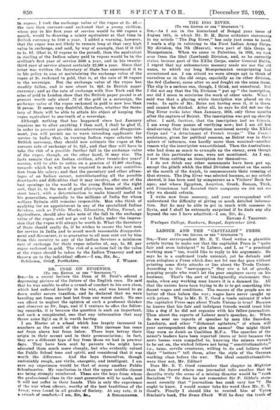THE DOG RIVER.
[To THE EDITOR OF THE " SPECTATOR.") SIR,—As I am in the hinterland of Bengal your issue of August 14th, in which Mr. D. H, Bates criticizes statements in my article "The Dog River," has only just come to hand.. I made a slip in referring to the First Indian Army Corps. My division, the 7th (Meerut), were part of this Corps in Mesopotamia. When we came to Palestine, in 1918, we took over from the 52nd (Lowland) Division, and, as he correctly states, became part of the XXIst Corps, tinder General Bulfin. I regret that my subconscious memory made me use the old name, to which my long Mesopotamian campaigning had accustomed me. I am afraid we were always apt to think of ourselves as in the old corps, especially as its other division, the 9rd (Lahore), came after us and fought on the same front. The slip is a serious one, though, I think, not unnatural. But I did not say that the 7th Division "put up" the inscription, nor did I mean to minimize the work of other units. What said was that a glaring white inscription was placed on the rooks. In spite of Mr. Bates not having seen it, it is there, and cannot be shirked. After all, he says he did not see the Dog River rocks later than January, 1919, only three menthe after the capture of Beirut. The inscription was put up shortly after. I said, further, that the inscription bad no friends. I am away from means of verifying now; but I am all but dead-certain that the inscription mentioned merely the XXIst Corps and " a detachment of French troops." The French assistance, given for political reasons, as Beirut was in their sphere of influence, was hardly more than nominal—another reason why the inscription was criticized. Then the Australians, who had done so much to crumple up the enemy, even though not in this particular area, were not mentioned. As I say, I saw them cutting an inscription for themselves.
I do not think any other monuments have been put up, except the plinth which the 52nd Division erected on the sands at the mouth of the Aujeh, to commemorate their crossing of that stream. The Dog River was selected because, as any article showed, it has been used by conquerors as a Visitors' Book for ages; and where Egyptian, Assyrian, Greek, Roman, Turk, and Frenchman had flaunted their conquests we did not see why we should refrain.
I write now from memory, and your correspondent will understand the difficulty of giving so much detailed informa- tion. But he may be able to get in touch with someone in Syria, and I shall be extremely surprised if he finds any slip beyond the one I have admitted.—I am, Sir,
EDWARD J. THOMPSON.
Wesleyan College, Bankers, Bengal, September 23rd.


































 Previous page
Previous page